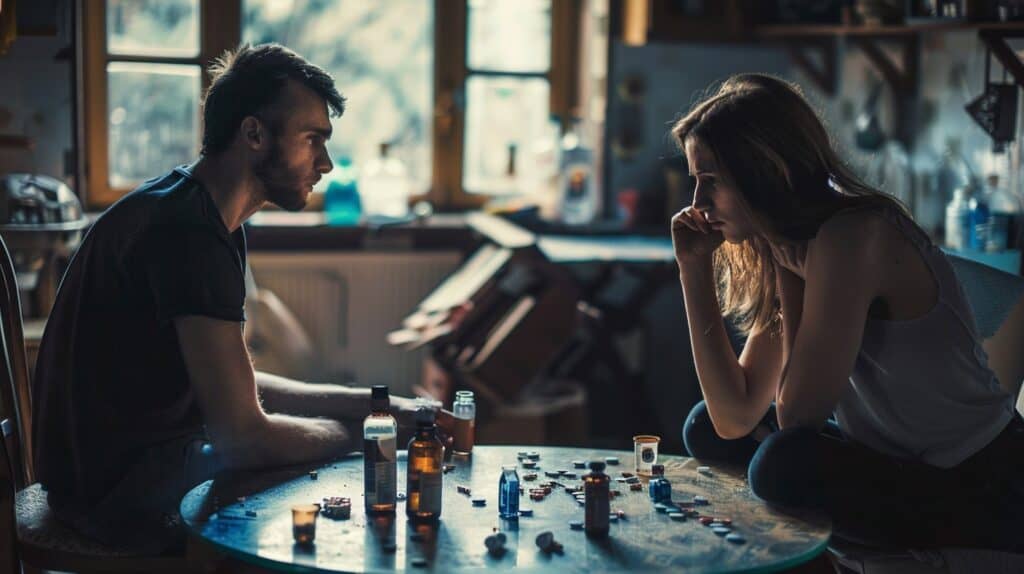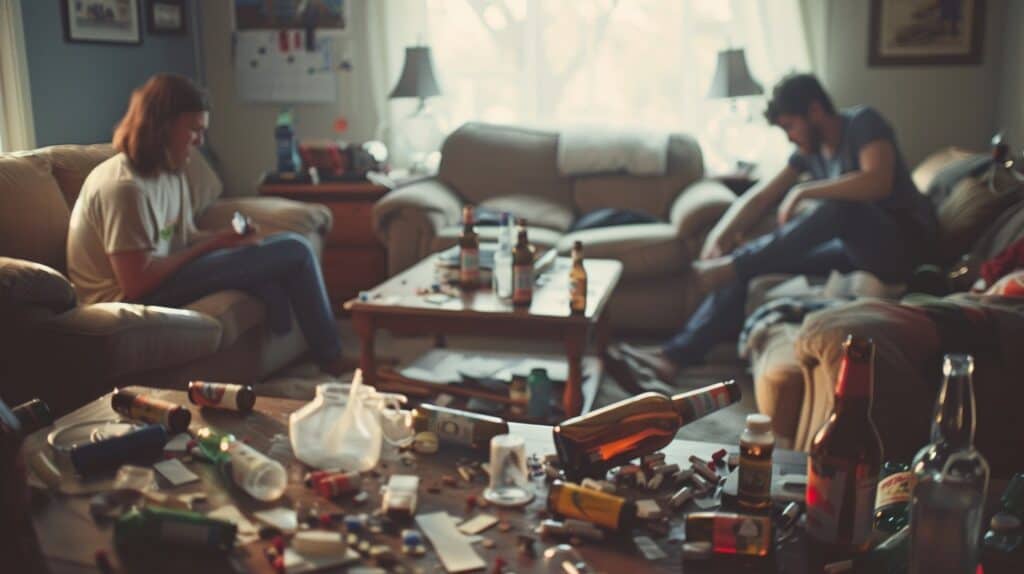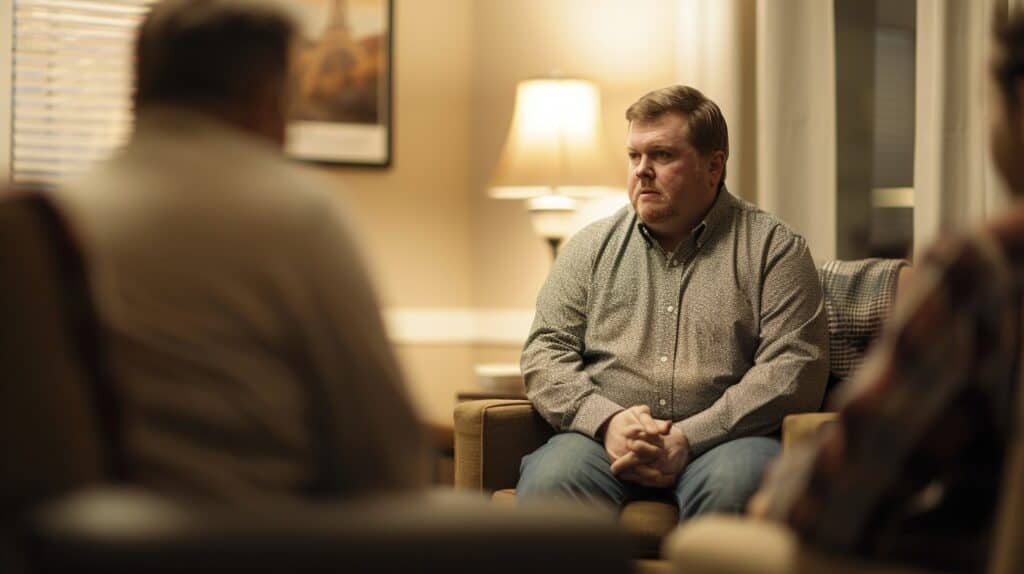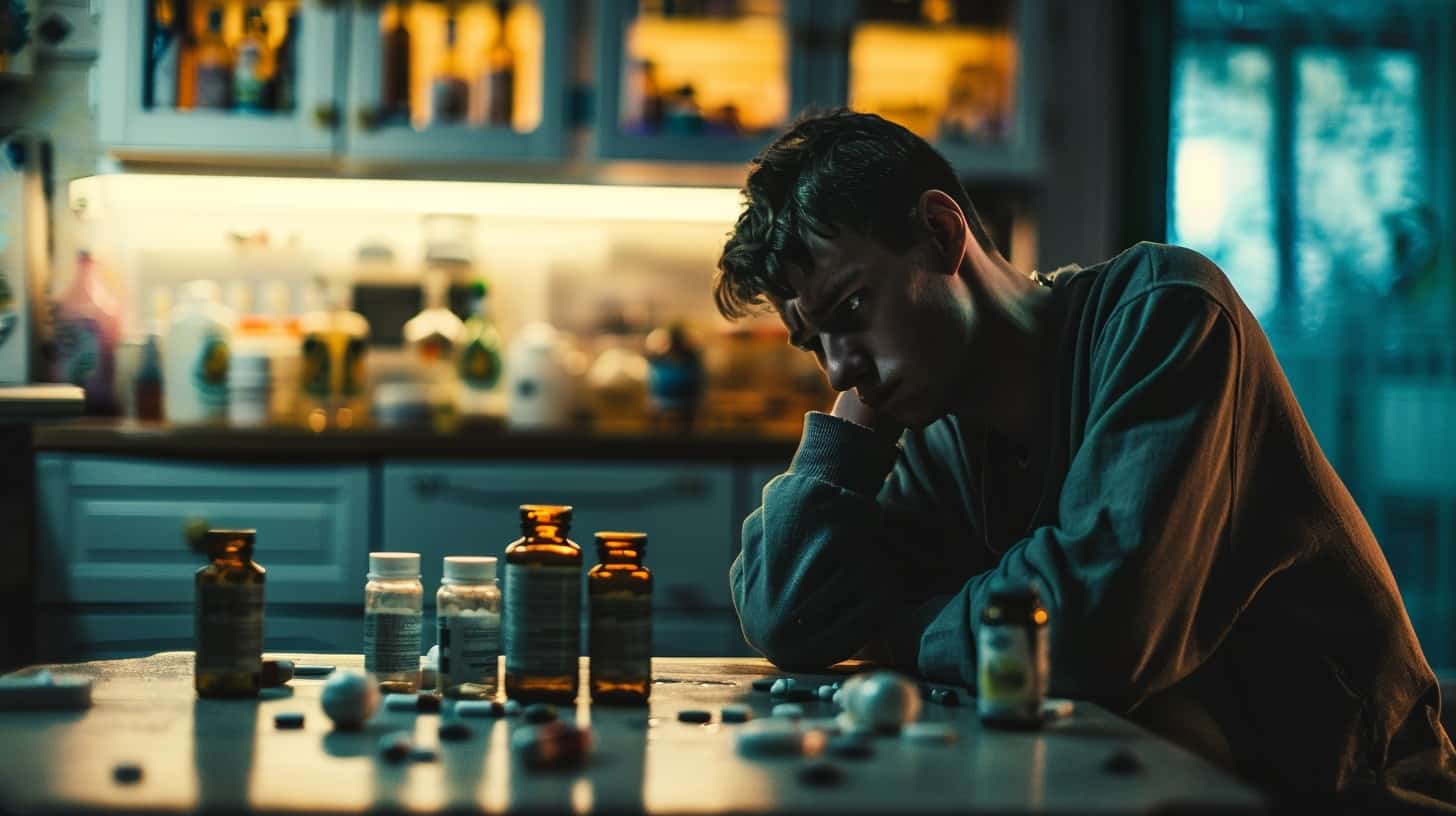Navigating a relationship with someone entrenched in the battle against addiction can feel like you’re grasping for connection amidst a storm. Truth be told, I know this tumultuous journey all too well – it’s far from smooth sailing.
Studies have consistently highlighted how addiction can erode the very emotional ties we yearn to strengthen. But hold on to hope; through this article, we’ll explore the heart of why those ensnared by addiction might find it hard to nurture a deep and loving bond and discuss paths toward healing these intimate connections.
Keep turning the pages with me – your perspective on relationships just might transform!
Key Takeaways
Addiction can take over a person’s feelings and actions, making them focus more on drugs or alcohol than on relationships.
Trust and communication often break down when someone has an addiction, making it hard to connect emotionally.
Codependency and enabling behaviors can develop in relationships with addicts, which hurts both partners.
Table of Contents
The Hard Truth: Why an Addict Can’t Love You

It’s tough, but someone addicted to drugs or alcohol might not be able to really love you. Their mind is often focused on getting the next high or drink, and that takes up all their space for feelings.
They’re not trying to hurt you; it’s just that addiction grabs them so hard they can’t see much else.
Addiction changes how people act and feel. A person with drug problems may lie, ignore your needs, or forget about the love they have for you. It’s like a wall goes up between their heart and everyone else’s.
Sure, deep down they care, but the drugs make it super hard to show it or even know it themselves sometimes.
The Struggle for Emotional Connection in Addictive Relationships

You know how it feels when you’re reaching out, trying to connect on that deeper level, and all you get back is this wall? Man, when addiction’s in the mix, it’s like trying to tune into a radio station that’s always just out of range – frustrating as hell.
Emotional Unavailability
So you’re wondering why it’s tough to connect with someone who’s battling addiction. Let me break it down for you. Emotional unavailability is a real problem when someone loves their substance more than anything else.
Their feelings are all over the place, they might be here one minute and gone the next, and I’m not just talking about leaving the room—I mean emotionally checked out.
It’s like there’s this wall between you and them, no matter how hard you try to break through. They can’t share their true selves because that spot is already taken by addiction. You end up feeling alone even when they’re right beside you on the couch.
Scary stuff, huh? And intimacy? Forget about it! Fear of getting close means they keep you at arm’s length to protect themselves from getting hurt or having to deal with tough emotions.
Now let’s talk about fear…
Fear of Intimacy
Feeling close to someone can get real scary for folks who struggle with addiction. They might want to love and be loved, but there’s this huge wall of fear between them and getting cozy with anyone else.
It’s like they’re stuck in a loop—wanting that tight bond but also pushing it away because getting too close feels like a threat.
This fear cuts deep and makes sharing feelings or building trust tough as nails. You see, drugs or alcohol often take the driver’s seat in an addict’s life. These things become their main squeeze, leaving little room for anyone else—even if they say you mean the world to them.
Love’s about more than just words; it takes showing up emotionally, too.
But there is some hope on the horizon—addressing fear of intimacy could lead to rebuilding what’s broken (hint: I’m talking about trust). Now, let me tell you something about what goes on when addiction messes with trust and communication…
Impact of Addiction on Trust and Communication

Man, when addiction crashes the party, it doesn’t just bring chaos to your life – it’s like a wrecking ball to trust and communication too. You think you’re getting the truth, but what you’re really getting is more excuses than a dog that ate homework – trust becomes as rare as honest politicians, and trying to talk it out? Forget about it; might as well be speaking different languages.
Broken Trust
Broken trust is like a smashed vase—you can try to glue it back together, but those cracks will always be there. Imagine you’re in a relationship where every time you reach out, your hand gets slapped away.
That’s what addiction does; it turns the person you care about into someone who lies and hides things from you. Your gut tells you something’s off, and sure enough, the deception shows up.
You start feeling like a detective in your own love story, piecing together clues of where they’ve been or what they’ve spent money on. Trust me, I know—it eats at your heart when communication breaks down because of substance abuse.
But here’s the deal: building that trust again won’t happen overnight. It takes work—and sometimes professional help—to stitch things back up right between two people after addiction has torn through their bond like a hurricane through a house of cards.
Communication Breakdown
Talking to another person seems simple, right? Well, not so much when addiction crashes the party. It’s like trying to have a conversation while someone keeps turning off the lights—you can’t see or get through to each other.
Trust me, I’ve been there; lying and hiding stuff becomes second nature for an addict. And what does that do? It shreds trust into pieces.
You try to chat about something serious—say, feeling drunk again—and bam! You hit a wall. Your words just bounce back at you because they’re hooked on their substance more than anything else in the world.
Communication breakdown isn’t just a phrase from some textbook; it’s real life when addiction takes hold. One minute you think everything’s cool; the next, you’re staring at your partner wondering if they even get what you’re saying.
Codependency and Enabling in Addictive Relationships

Let me tell ya, when you’re wrapped up in a relationship with an addict, it’s like a two-for-one deal on trouble. You think you’re just trying to help ’em out, keep the peace – but next thing you know, your good intentions have brewed up this gnarly beast called codependency.
It’s sneaky; we end up enabling the very habits that tear us apart because—let’s face it—we’ve become as hooked on them as they are on their vice…
Characteristics of Codependent Relationships
I get it, being in a relationship with an addict is tough. You want to help them, love them, but it’s like whatever you do just isn’t enough.
Breaking the Cycle of Enabling
I know it’s tough to face, but loving an addict can sometimes mean getting caught in a cycle of enabling. We often think we’re helping when we’re actually making things worse. Here’s what you need to know:
- Understand what enabling is. It’s doing stuff for an addict that they can handle on their own if they weren’t using drugs or alcohol.
- Realize that covering up for them, like calling in sick to their work when they’re hungover, isn’t really helping.
- Recognize the signs of codependency. You might be putting their needs before your own and losing track of who you are.
- See the harm in giving them money which might be used for buying substances instead of important things like food or rent.
- Stop making excuses for their behavior. It’s easy to blame stress or bad luck, but addiction is the real issue here.
- Set clear boundaries. Decide what you will not tolerate and stick to it – this shows that their actions have real consequences.
- Seek out support groups. Talking with others who understand can give you strength and knowledge.
The Role of Mental Health in Addictive Relationships

You ever get that feeling like something’s just off, and you can’t quite put your finger on it? That’s pretty much how mental health weaves its way into the fabric of a relationship with an addict.
It’s not always about the drugs or the booze; sometimes it’s the shadowy dance of depression or anxiety lurking in the background, playing puppet master to every twist and turn.
Co-occurring Disorders
Picture this: your partner’s dealing with addiction, and on top of that, they’re wrestling with mental health issues like anxiety or depression. It can feel like you’re fighting a losing battle.
I get it—when these co-occurring disorders show up, they bring along a whole mess of problems for both of you. Trust gets shaky, and talks turn into shouting matches or silent treatments.
Think about trying to build a house on quicksand; that’s what it’s like trying to have a healthy relationship when mental well-being takes hit after hit. Sometimes there’s bipolar disorder or PTSD in the mix too, making things way tougher than just dealing with substance abuse alone.
What happens then? Feelings get hurt all around as communication crumbles—and man, does it sting when words fail and eyes wander away from each other during those deep conversations we need so badly..
Addressing Mental Health Needs
So, let’s talk about tending to the mind while dealing with addiction. It’s like trying to fix a car with a busted engine; if you ignore the engine—aka our mental health—the car won’t run right, no matter how much work you do on the outside.
A lot of times, folks who fall into addiction battle with things like fear of being close to someone else or feeling too many emotions at once.
Dealing with these hidden monsters is tough. They’re part of why loving can seem like a maze without an exit for someone wrapped up in substance use. Mental illness and addiction often hang out together, making it harder for anyone to get better.
Think of them as unwelcome guests at a party in your head; you’ve got to send them both packing if you want peace.
I’ve seen guys open up when they finally face their feelings and talk through stuff that’s been eating at them for years—things that got tangled up with drinking or drugs. Finding help from therapists or support groups sparks hope because when that healing starts inside, change begins.
Now onto something equally important is ‘Navigating Recovery and Rebuilding Love’.
Navigating Recovery and Rebuilding Love

Let’s get real here, guys—kicking an addiction isn’t just about getting sober; it’s a full-on reconstruction project for your heart and relationships, too. When you’re tangled up in the messy world of addiction, love kinda takes a backseat (oh, the irony!), but as you stride into recovery—that gritty yet glorious road—there’s this chance to patch things up and rediscover what love really means…
And let me tell ya, places like Indiana Drug Rehab—they don’t just hand you a roadmap; they become your pit crew in this absolute marathon towards rebuilding trust and firing up that emotional intimacy again.
It ain’t easy—a whole lot of potholes on that track—but man, is it worth every step.
Involving Partners in Treatment
Getting my partner involved in my addiction treatment was a game-changer. It’s like, suddenly, I wasn’t alone in the ring fighting the big addiction monster. She became more than just support; she turned into my teammate.
We’re talking about real emotional backup here—plus, she’s keeping me on track. It’s not always easy for her to deal with all this stuff – things get tough—but knowing we’re tackling it together makes a world of difference.
Let’s face it, walking through fire is less scary when someone’s holding your hand. That’s how couples therapy felt for us during rehab. We learned how to talk without throwing blame bombs and really listened instead of just waiting to talk.
Facing our issues head-on and working through them? That made us stronger than before—not just me as an individual, but us as a team, united against whatever tries to knock us down again.
Reestablishing Trust and Emotional Intimacy
Okay, here’s the deal. Trust and emotional intimacy—yeah, they took a hard hit while I was wrapped up in my addiction. But now? It’s all about fixing that mess, rebuilding what got broken.
Couples therapy is huge for this, like a toolbox full of ways to patch things up with your partner.
So we sit down with this therapist, right? And it feels weird at first. But then you start talking and listening—like really hearing each other—and bam, those walls start to come down.
You learn how to not just talk, but connect on a deeper level again. It’s slow work bringing back trust and getting all cozy emotionally after everything that’s gone down, but buddy… it is worth every effort.
Understanding the Impact of Substance Abuse on Relationships

Look, grappling with an addiction is like trying to steer a boat through a hurricane while blindfolded — it’s all-consuming and chaotic. Now throw in relationships, and you’ve got yourself the perfect storm; where those substance abuse waves hit hard against your hull of love and communication, often leaving nothing but wreckage in their wake…
Let’s dive deep into how that bottle or pill can end up capsizing more than just your own lifeboat.
The Distortions of Substance Abuse
I get it, buddy. You’re in a tight spot because your partner’s drug use messes with everything. See, drugs twist a person’s brain around—they make them think and act in crazy ways.
Your partner might say one thing but do another, totally different thing, all because of the substance addiction. They seem obsessed with getting their next fix and don’t care about much else.
And here’s the kicker—when you love someone who’s hooked on something bad for them—it hurts you too. Trust gets smashed to bits when lies start piling up like dirty laundry. The two of you should be talking things out and sharing feelings, but instead it feels like she just doesn’t hear you anymore or worse – doesn’t want to deal with real talk at all.
Substance abuse is tricky—it grabs hold of a person so hard that sometimes they can’t even see how it’s wrecking their relationships or hurting people like yourself who really care.
The Self-Centered Nature of Addiction
So, you’re up against addiction, and it’s like the drugs shout louder than your voice. It’s tough to see, but that bottle or pill becomes the main thing for a person with an addiction.
They might not mean to hurt you, but their world starts spinning around getting and using more, no matter what it costs them—or you.
It hit me hard when I realized my friend couldn’t trust me anymore because of my past drinking days. We’d plan something simple like fishing on Saturday, yet he’d end up waiting by the lake alone ’cause I was chasing a high instead of hanging out with him.
That’s the reality: Communication breaks down and promises start to feel like empty words. It’s not that they don’t care—it’s that addiction makes them care about one thing way too much.
The Prioritization of Substance over Relationships
I get it, man. Loving someone who puts drinking or drugs first is tough. They might say you’re the most important thing to them, but their actions show something else. It’s like, no matter how hard you try to grab their attention, the addiction is always louder; it’s a battle where you feel invisible.
Truth hurts – when addiction takes hold of someone, relationships take a backseat. Imagine trying to build trust and actually connect with someone who’s often lying or keeping secrets because of their substance use.
That kind of stuff breaks down communication fast and makes emotional closeness nearly impossible. Your relationship ends up playing second fiddle to those cravings they can’t shake off.
And that’s just not fair to you or anyone else in their life.
The Effects of Substance Abuse on Relationships

Substance abuse is like a wrecking ball—swinging through a relationship, slamming into trust and intimacy, leaving behind a mess of emotional chaos… But hey, it’s not the end of the story; stick around to find out how, even from this rubble, something stronger can be built.
Breakdown of Trust and Communication
Trust is like the glue in a relationship. It holds everything together. But imagine that glue melting away because someone lied or hid things. That’s often what happens when we love an addict.
They might lie to cover up their drug use, and before you know it, trust starts slipping through our fingers. We start doubting everything they say and do.
Now think about trying to talk to them. Communication should be easy, right? Not with addiction in the mix—it’s like shouting into a storm and hoping your voice gets heard. When I try talking heart-to-heart with my partner who’s using drugs, it feels pointless.
Their mind is somewhere else—focused on the next high—not on us or fixing our problems.
So here we are, feeling alone even when we’re together—that’s the harsh truth of living with addiction (emotional support). But if you’re facing this too—know you’re not by yourself…
Now let’s look at “Codependency and Enabling in Addictive Relationships“, where things get even more tangled up.
Emotional and Psychological Impact
So, trust and communication have fallen apart. Now let’s talk about what this mess does to your heart and mind. Being with an addict can really mess with your feelings. You might feel alone, sad, or even scared a lot of the time.
Your partner is deep in their addiction, and it seems like they don’t even see you anymore.
You start asking yourself why you’re not good enough. But here’s the thing—it’s not about you at all. Their drug comes first—always—and that leaves little room for caring about anyone else’s feelings, including yours.
You might also be dealing with mood swings or emotional outbursts from them, which can make things rough at home.
And then there’s the guilt – maybe you think if only I loved them more, they’d stop using? That thinking will eat away at your self-esteem because no matter how much love you give; it won’t fix their addiction.
Remembering this is tough when every day feels like a battle just to keep your relationship breathing.
But hey, digging into these emotional wounds takes guts and means facing some messy truths head on—that’s bold work right there!
Financial Strain and Instability
Money troubles pile up fast when addiction enters the picture. Maybe you’ve noticed it – paychecks disappearing or bills piling up because drugs or booze seem more important than keeping the lights on.
It’s rough, right? You’re trying to hold everything together, but it feels like you’re stuck in quicksand.
Here’s what happens: The cash that should go toward our future gets sucked into feeding the addiction. We might even start dodging calls from debt collectors or lying about where the money went.
Yep, I’ve been there; pretending things are fine when they’re not is exhausting. Getting help from pros can turn things around, though – they show us how to manage our money better and keep us from sliding back into old habits that break the bank and trust in our relationships.
Social Isolation and Relationship Dysfunction
I know how addiction can mess up relationships. It’s not just about the fights and hurt feelings—it goes deeper. Addiction can make a person pull away from everyone they care about, even if they don’t mean to.
They might start choosing drugs or alcohol over spending time with friends and family. And I get it; sometimes the substance seems like the only thing that understands.
This push away hurts both ways, you know? Being isolated makes everything feel tougher for an addict, and for people who love them, feeling pushed out is really hard to deal with. The whole situation sets off this cycle where trust breaks down and talking things through just doesn’t happen like it should.
So then there’s this next part: dealing with codependency and enabling in these tangled-up relationships…
Recovery and Healing: Rebuilding Relationships
When it comes to recovery and healing, let’s not kid ourselves—it’s no walk in the park. But man, rebuilding those bridges we’ve torched? It’s worth every tough step. We’re talking about rolling up our sleeves and getting down to the nitty-gritty of fixing what addiction wrecked, without pointing fingers or dwelling on past mistakes.
Because at the end of the day, a relationship coming back from the brink—that’s real strength. Now that’s something I’ll dive deeper into…
Seeking Professional Help and Support
Getting help from a pro can make a big difference. I know it’s tough, but reaching out to an addiction counselor or joining a support group is a smart move. It helps you and your partner connect better and trust each other more.
You learn how to talk things through—and listen too.
Sometimes, going to therapy with your partner is what you need. It builds up your skills in talking and trusting. Plus, it makes your relationship stronger and more loving. Believe me, getting clean takes work from both of you.
Support and understanding are key here—you’re in this together.
Establishing Boundaries and Self-Care
Okay, so you got help. Great start! Now, let’s talk about drawing the line and taking care of yourself. You see, setting boundaries isn’t being mean or uncaring—it’s about protecting your own heart and mind.
Think of it like putting up a fence around your yard; you decide who comes in and how far they go.
Self-care is just as important. It’s doing things that make you feel good and stay strong—like hanging out with friends who lift you up, going for a run to clear your head, or just turning off the phone for some quiet time.
Taking these steps keeps you healthy—and when you’re healthy, your relationships have a better shot at getting stronger, too.
Encouraging Treatment and Sobriety
It’s tough to watch someone you care about struggle with addiction. You might feel helpless, but there’s a lot you can do to support them. Pushing for treatment and sobriety is a start.
Getting professional help could be the game-changer they need. Now, I’m not saying it’ll be easy – far from it. But joining support groups or looking into rehab centers can open doors for both of you.
Treatment isn’t just about stopping the drinking or drug use; it’s also about getting your life back on track together. Boundaries are key here—they protect you both. It takes resilience and a whole bunch of patience, sure, but healing together? That makes all the difference in rebuilding trust and fixing what got broken along the way.
Encourage them, stand by their side—it matters more than you think.
Rebuilding Trust and Communication
Trust and communication don’t just fix themselves, especially after they’ve taken a hit from addiction. Here’s the deal: getting these back on track is like rebuilding a house after a storm—it takes work, patience, and the right tools.
First, you have to show up. I mean, really be there for your partner—not just in body but in mind too. Then comes active listening; that’s when you listen to understand, not just wait for your turn to talk.
Now, let’s get something straight—talking things out isn’t always going to be easy. You might hear things that sting or make you mad. But it’s all about keeping cool and working through problems together with honesty and respect.
Repairing trust means proving over time that your word is good as gold—that what you say matches what you do. And this isn’t a one-off thing; it’s an every single day commitment to being someone who can be counted on.
You’ve got this by remembering support goes both ways in healing relationships touched by substance abuse (trust me on this). So while you help each other grow stronger, never forget how important understanding and backing each other up are for making it through tough times—and coming out healthier on the other side.
FAQs About Why an Addict Can’t Love You
Can a person struggling with addiction truly care for someone?
Well, here’s the thing… When someone is deep into drug addiction or binge-drinking, their mind is all over the place. They might feel love but showing it? That’s tough. Their emotions are like a roller coaster – up, down and all-around crazy town!
What could happen in a romantic relationship with an addict?
Oh boy, brace yourself! It can be like trying to hug a cactus – ouch! You’re looking for those warm fuzzies, but often end up with emotional distress and maybe even some psychological abuse. Not exactly the fairy tale you signed up for.
Why do addicts act out so much?
Imagine having low self-esteem and tons of shame tagging along everywhere you go… Sounds exhausting, right? Addicts carry these heavy feelings, which can make them turn into emotionally abusive ninjas or controlling partners.
Is there any hope for change if my partner goes to rehabilitation?
Yes! Rehab centers are like superhero training camps where addicts work on kicking bad habits to the curb (goodbye drugs, hello new life!). They get help from therapy sessions, including those snazzy twelve-step programs or cognitive-behavioral therapy – it’s all about personal growth and better communication skills.
How important is support during recovery?
Support networks are as crucial as morning coffee! Having compassionate friends and family around makes everything less scary when dealing with trauma-informed care issues like PTSD or other mental health disorders.
I heard something about holistic medicine; does that help too?
Absolutely! Complementary therapies – think acupuncture or essential oils – join forces with medication-assisted treatment to treat substance use disorders holistically (which just means treating the whole person). So yeah, body and mind getting back in sync; now that’s what we call healing!




